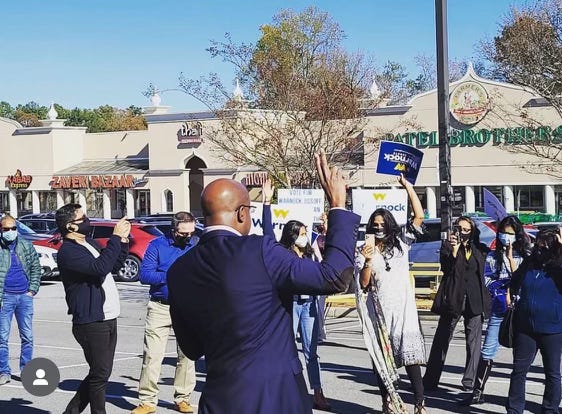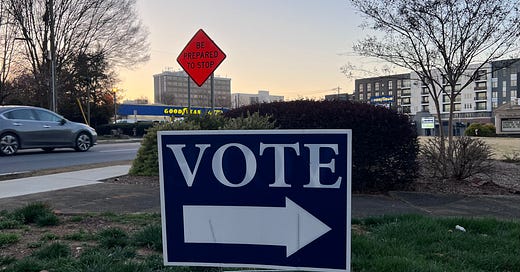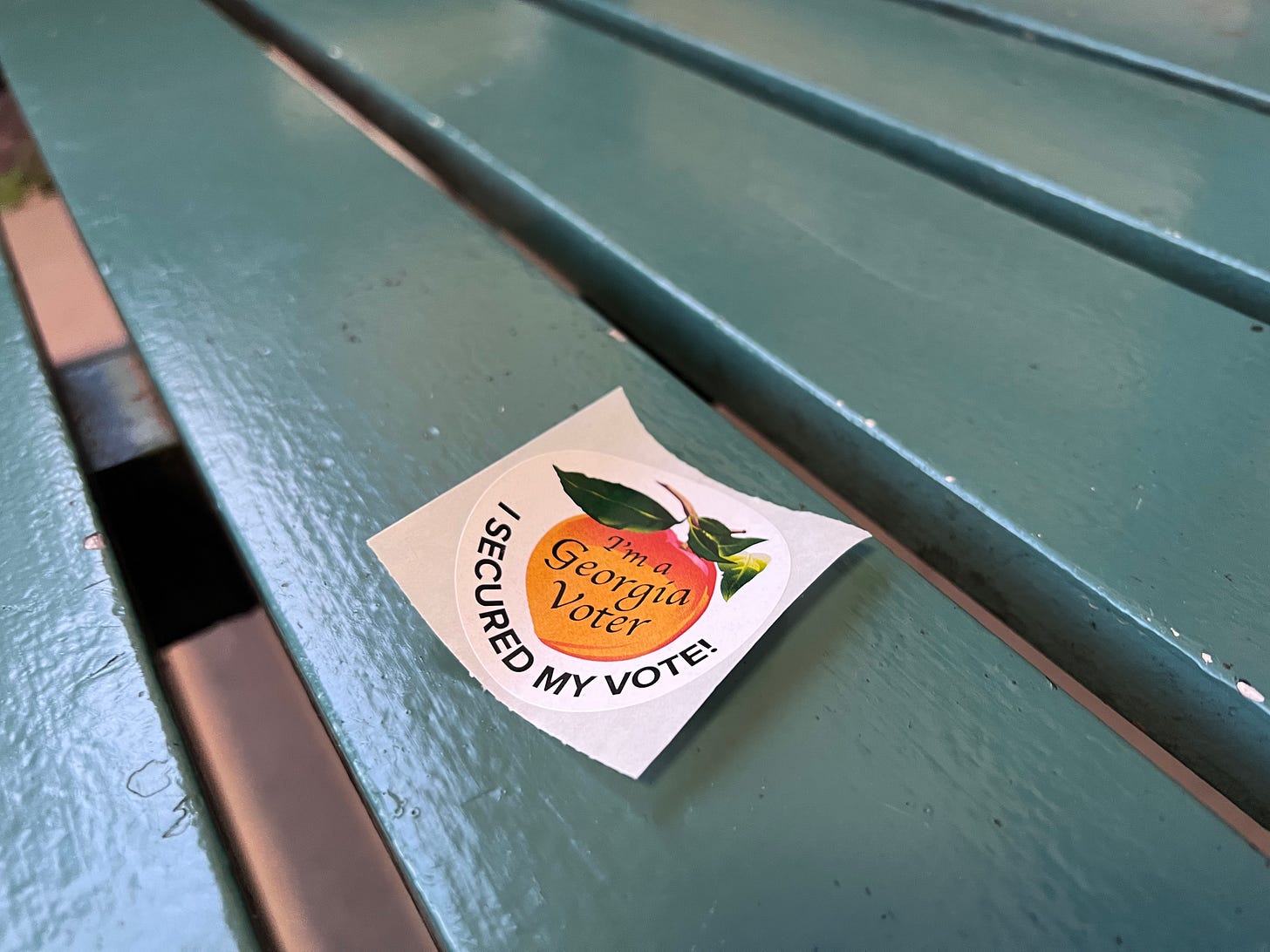South Asian voter group splits with parent PAC to form Desis For Democracy
They See Blue says they don’t want any part in painting Democrats in a negative light, but its Georgia chapter maintains accountability is essential.
Written by Fiza Pirani, an Atlanta-based writer and editor, and founder of Foreign Bodies, an immigrant mental health newsletter .
Former members of the Georgia chapter of They See Blue, a pro-Democrat South Asian voter outreach group, have told 285 South they have broken off from their parent organization after internal conversations about the ethics of promoting President Biden or the Democratic Party without accountability.
In 2019, a group of South Asians in Metro Atlanta launched the Georgia chapter of They See Blue, a grassroots group with more than 5,000 members nationwide dedicated to mobilizing voters with Bangladeshi, Bhutanese, Indian, Maldivian, Nepali, Pakistani or Sri Lankan heritage to vote Democrat. They are among the fastest-growing and most politically progressive segments of eligible voters in the U.S.
The organizers’ work paid off — they were a part of a voter turnout machine that had historic impact. During the 2020 election, at least 400 volunteers joined the Georgia chapter, determined to flip the Peach State’s red districts and prevent a second Trump presidency. Some were trained to be poll workers, while others canvassed and helped mail over 7,000 postcards on behalf of Democratic candidates or called and texted thousands of South Asian voters in the metro and beyond, according to the organization’s website.

The mood this election season is different.
It’s been more than five months since Israel began its military campaign in Gaza, which has killed more than 30,000 people, the majority of them women and children. Former members of They See Blue-GA are saying they expect more from those they worked so hard to elect. "We are very disappointed in Democrats who haven't been supporting or calling for a ceasefire and will keep bringing the issue up to elected officials,” said Zeenat Syed, a Forsyth County resident who had been with the Georgia chapter since 2020.
Georgia leaders who spoke to 285 South say at least three members brought their concerns to national leadership, but were dismayed by the organization’s stance.
“They told us it’s a very complicated issue,” said Syed. “As a national organization responsible for getting South Asians to vote Democrat, they don’t want to play any part in painting Democrats in a negative light.”
In February, the Georgia chapter informed their parent political action committee (PAC) that they would be parting ways. They See Blue-GA, led by Syed and other former members, have since established itself as Desis For Democracy (d4d).
According to Syed, d4d’s mission is to mobilize South Asians in the region to vote for the person who represents them best — whether they’re Democrat or third party — and then hold them accountable for their words and actions.
“Some people actually came out and said that because of the jobs they have, they couldn’t be affiliated with a PAC, anyway,” Syed said. “So now that we’re a volunteer organization, it’ll be easier for them to participate in our activism.”
They See Blue cofounder Rajiv Bhateja is a retired Silicon Valley engineer from Bangalore who got his start in the political arena volunteering for the 2008 Obama campaign. He said he understands and sympathizes with frustrated former They See Blue-GA members, and said he wishes them well as they branch off, even if there may be some leftover bitterness.
“I've been to Israel, and I've seen firsthand the plight of the Palestinians,” he said. “I have friends who are from Israel and friends from the West Bank, and I hear both sides. I totally agree that Biden is not doing enough. But you heard what Trump said, right? He said we need to go into Gaza and finish the job. That's how bad that side is.”
Bhateja doesn’t believe the answer to any of this is to bad-mouth Democrats solely because a candidate doesn’t support a particular issue; doing so only reduces their chances for getting elected and plays into the hands of Republicans, he said. He supports members who want to do so on their own — just not under the They See Blue umbrella and name.
Activists within the Georgia chapter said they feel strongly about a number of issues beyond Gaza that will surely keep coming up in local elections, from Black Lives Matter to trans rights to women’s reproductive rights.
“Of course we don’t want a repeat of 2016, either,” Syed said. “But if a senator does not vote ‘yes’ on a bill that's important to us, we want to send them a message that, hey, we voted for you and we expected you to represent our wishes.”
Bhateja admits much of the disenchantment he’s seen within the organization is generational.
“Younger members are very turned off by the cruelty and the fact that the U.S. is providing so much support to Israel,” he said.
Though he believes their anger is justified and even shared, Bhateja says it’s naive to hold higher demands of politicians who, he believes, have their hands tied by powerful lobbying organizations like the American Israel Public Affairs Committee (AIPAC).
When asked about South Asian voters curious about voting beyond the two parties, such as socialist campaigns led by educators Claudia De la Cruz and Karina Garcia, Bhateja said he’s no stranger to political idealism as a former University of California-Berkeley student. “I was young once, too,” he jokes. But he doesn’t believe such ideals are realistic in the existing political realm.
The decision to part ways with They See Blue was difficult but necessary, Syed said, and she hopes d4d can still work together with the organization in some capacity to mobilize voters.
But for now, Syed and fellow d4d members are joining organizers with the Peach State Muslim Coalition, Jewish Voice for Peace Action and the Council on American-Islamic Relations Action in the Listen to Georgia - Leave it Blank campaign encouraging voters to ask for a Democratic primary ballot on Election Day (today) and leave their tickets blank.
Similar to “uncommitted” initiatives in Michigan and Minnesota, and elsewhere in the country, the idea is to send a clear warning to the Biden Administration and Democratic candidates that the status quo can’t continue.
“For many of us in Georgia, this is not a complicated or foreign issue,” Syed said. “It's a humanitarian issue. When my tax money pays for genocide, and you can't even call for a ceasefire… I’m going to make my vote heard.”








The debate between idealism and practicality, between big swings and incremental change or harm reduction, will continue. But this piece brought forward the very real consequences and imperative of our choices. I respect their commitment and, ironically, the "uncommitted" effort.
Money drives which legislation gets crafted and passed. Change the definition of "legal tender".